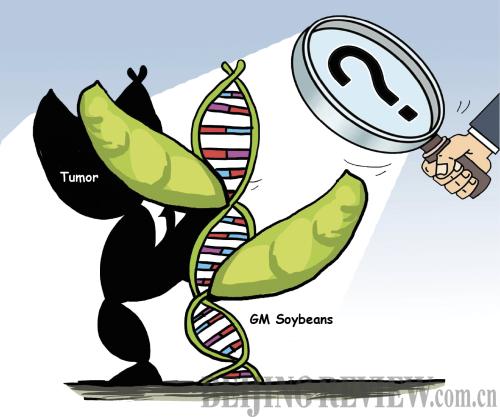|
 |
|
(CFP) |
A reported correlation between genetically modified (GM) soybeans and cancer is the focus of the latest debate over food safety in China.
Areas with the highest incidence of cancer consume the most GM soybean oil in China, including provinces Henan and Hebei and eastern coastal areas Shanghai and Jiangsu, according to Wang Xiaoyu, Deputy Secretary General of the Heilongjiang Soybean Association.
China Central Television reported Wang's research on its website, Cntv.com, on June 20. Wang said that his findings were based on the annual report on China's cancer registry in 2012.
"For example, the gastric cancer occurs frequently in Jiangsu that processes the most GM soybeans across the country. Its neighboring Shandong Province, where the people mostly consume peanut oil, is not a high-incidence area of cancer," Wang said.
According to Wang, more than 90 percent of soybean oil, a major edible oil for Chinese consumers, is made from imported transgenic soybeans. China now produces only non-GM soybeans.
In response, Yang Xiaoguang, a researcher with the Institute of Nutrition and Food Safety at the Chinese Center for Disease Control and Prevention, said that GM foods licensed globally have all passed safety assessments and there are no experimental data indicating GM foods can lead to cancer.
"Americans consume more GM soybeans than Chinese do. But there has not been a big increase in cancer patients in the United States since GM soybeans have become part of every American's daily diet," said Zhu Yi, an associate professor of food science at China Agricultural University.
The verbal jabs have caused a stir among the public, as more GM soybeans are hitting China's market.
The Ministry of Agriculture (MOA) confirmed on June 13 it had approved imports of three varieties of GM soybeans to be made into cooking oil.
Three varieties of GM soybeans, which all fare better against insect attacks and herbicide, have been approved for commercial planting or consumption in many countries, including the United States, Canada, South Korea and Japan, the statement said.
Peng Yufa, Deputy Director of the committee, said that the entire review process for the three varieties was carried out in strict accordance with the law and their safety is guaranteed.
Though authorities try to reassure the safety of GM products, there is still widespread skepticism.
Gu Xiulin, a professor at Yunnan University of Finance and Economics, believes China should develop its own tests to check the risks of GM products to people's health.
"The tests must be long-term in nature and last over a period of years rather than months. Only then can problems be revealed," Gu said.
A controversial issue
Genetic modification of organisms took off in the 1970s, when scientists spliced selected genetic material from one organism into that of non-related species to create the first transgenic organisms.
The U.S. Food and Drug Administration approved the Flavr Savr tomato in 1994 after two years of evaluations. The tomato became the first genetically engineered food approved for human consumption.
In 2012, the area cultivated for GM crops rose to 170.3 million hectares worldwide from only 1.7 million hectares in 1996, according to a report released in February by the International Service for the Acquisition of Agri-biotech Applications (ISAAA), an international NGO that promotes the use of agricultural biotechnology.
Despite this, GM foods remain controversial nearly two decades after commercial introduction, as there is still no consensus on whether or not it is harmful to the human body.
| 